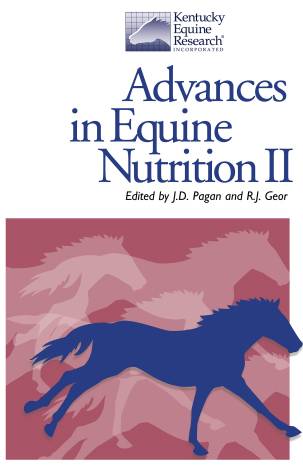
Advances in Equine Nutrition Volume-II
1998 – 2000
Advances in Equine Nutrition, Volume II features original research and review papers from the 1998, 1999, and 2000 KER Equine Nutrition Conference for Feed Manufacturers. The conference showcases international authorities on nutrition, sports medicine, and veterinary topics pertaining to the horse. These authorities have not only refined nutritional requirements of horses, but they have also discovered ways to most effectively deliver nutrients necessary to fuel horses in all athletic endeavors to achieve optimal growth in young horses and to ensure.

General Nutrition
- A Practical Method for Ration Evaluation and Diet Formulation: An Introduction to Sensitivity Analysis
- Factors Affecting Mineral Digestibility in Horses
- Nutraceuticals: What Are They and Do They Work?
- Feed Manufacturing Technology: Current Issues and Challenges
- Molasses in Feeds
- Grain Processing for Horses: Does it Pay?
- Partitioning Digestion in Horses and Ponies
- New Methods for Assessing Substrate Utilization in Horses During Exercise
- The Many Phases of Selenium
- Starch Digestion in the Horse
- Effect of Corn Processing on Glycemic Response in Horses
- Assessment of Selenium Status in Horses
- Effect of Different Cereal Grain on Equine Diet Digestibility
- Chemical Characterization and In Vitro Fermentation of High Temperature Dried Alfalfa and Grass Hay
- Relationship Between NDF and Hay Intake in Horses: A Review of Published Studies
- Effect of an Aluminum Supplement on Nutrient Digestibility and Mineral Metabolism in Thoroughbred Horses
- Forage Analysis: Three Points to Consider
- Hard to Find Nutrients for Ration Evaluations: Filling in the Holes
- Glucosamine Inhibits Nitric Oxide Production in Equine Articular Cartilage Explants
- The Influence of Fruit Flavors on Feed Preference in Thoroughbred Horses
- Voluntary Intake of Loose Versus Block Salt and Its Effect on Water Intake in Mature Idle Thoroughbreds
Growth and Development
- Energy, Protein and Amino Acid Requirements for Growth of Young Horses
- Influence of Housing on Bone Growth and Cartilage Metabolism in Weanling Horses
- Influence of Housing on Behavior in Weanling Horses
- Stalling Young Horses Alters Normal Bone Growth
- The Effect of a Nutritional Supplement on the Incidence of OCD Lesions, Future Performance and Bone-Related Lameness of Standardbred Weanlings
- The Role of Vitamins in Growth of Horses
- The Effect of Dietary Selenium Source and Level on Broodmares and Their Foals
- Nutritional Status of Broodmares and Foals on Commercial Farms in Ontario
- Mineral Intake from Milk and Pasture in Nursing Foals
- Establishment of Normal Growth Rates of Thoroughbreds in Japan
Nutrient Requirements
- Nutrient Requirements of the Young Equine Athlete
- Comparison of the Digestible Energy (DE) and Net Energy (NE) Systems for the Horse
- Establishing Nutrient Requirements of Horses and Other Animals in an Era of Modeling
- Advances and Gaps in Energy Nutrition
- Protein and Amino Acids
- Feeding Standards for Energy and Protein for Horses in France
- Vitamin Requirements in the Horse
- Micromineral Requirements in Horses
- Macrominerals - Calcium, Phosphorus and Magnesium
- Macrominerals - Sodium, Potassium and Chloride
- Japanese Feeding Standards
- German Feeding Standards
- The Effects of Intake Level on the Digestibility and Retention of Copper, Zinc and Manganese in Sedentary Horses
- Apparent Digestion of Hay/Grain Rations in Aged Horses-Revisited
Pathological Conditions
Feeding Practices
The Performance Horse
- The Effect of Level and Type of Dietary Fiber on Hydration Status Following Dehydration with Furosemide
- Metabolic Effects of Warm-Up on Exercising Horses
- The Effect of Long-Term Diet Restriction on Thyroxine and Triiodothyronine Concentrations and Metabolic Responses in Horses Fed and Pasted Prior to Exercise
- Studies of Fat Adaptation and Exercise
- Behavioral and Physiological Responses of Horses to Initial Training, The Comparison Between Pasture Versus Stalled Horses
- The Effect of Exercise on the Digestibility of an All Forage or Mixed Diet in Thoroughbred Horses
- A Comparison of Grain, Vegetable Oil and Beet Pulp as Energy Sources for the Exercised Horse
- Timing and Amount of Forage and Grain Affects Exercise Response in Thoroughbred Horses
- Nutritional Ergogenic Aids in the Horse - Uses and Abuses
- Glycogen Depletion and Repletion in the Horse - Possible Limiting Factor in Performance (Review)
- Time of Feeding Critical for Performance
- Vitamin Requirements and Supplementation in Athletic Horses
- The Effect of Fish Oil Supplementation on Exercising Horses